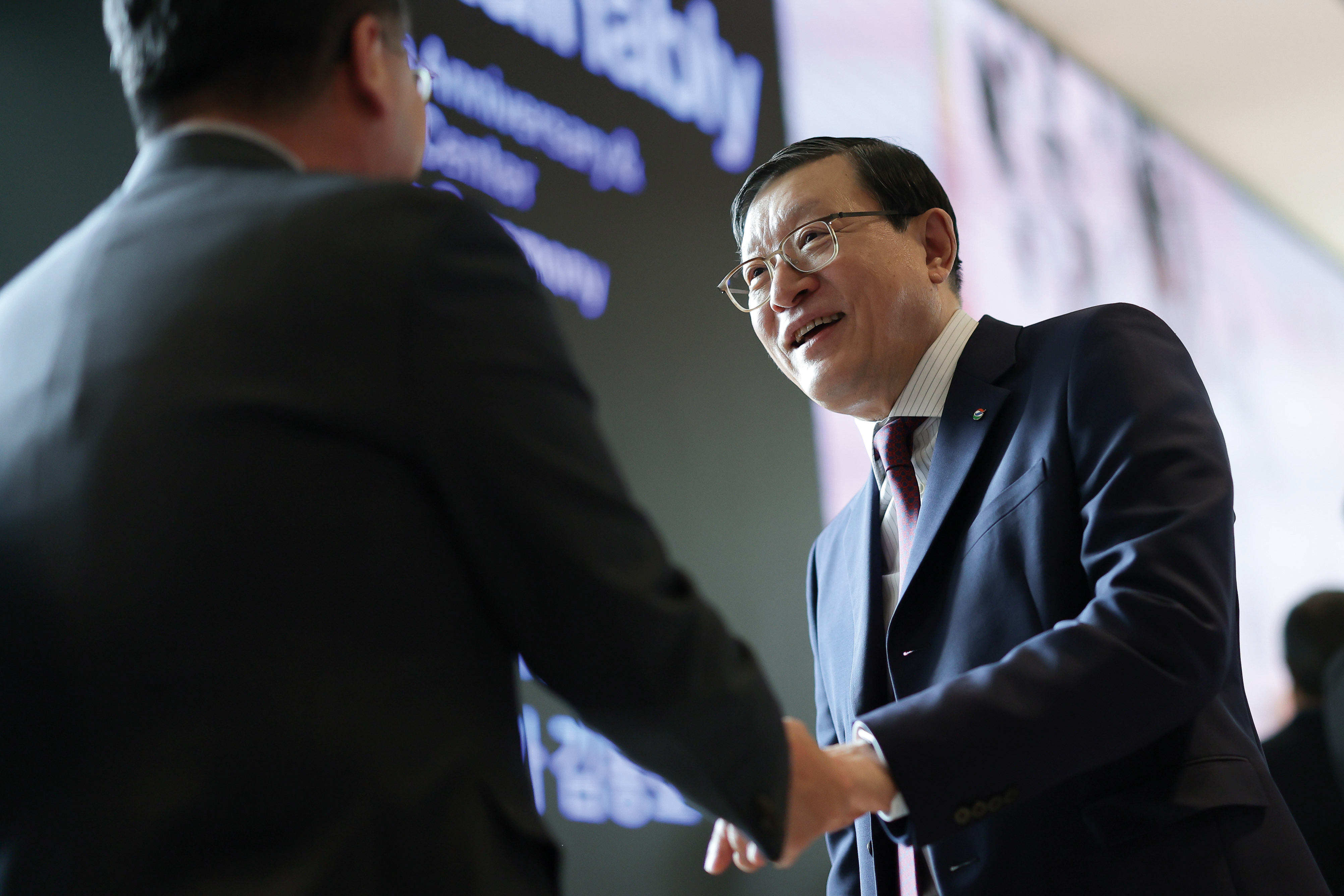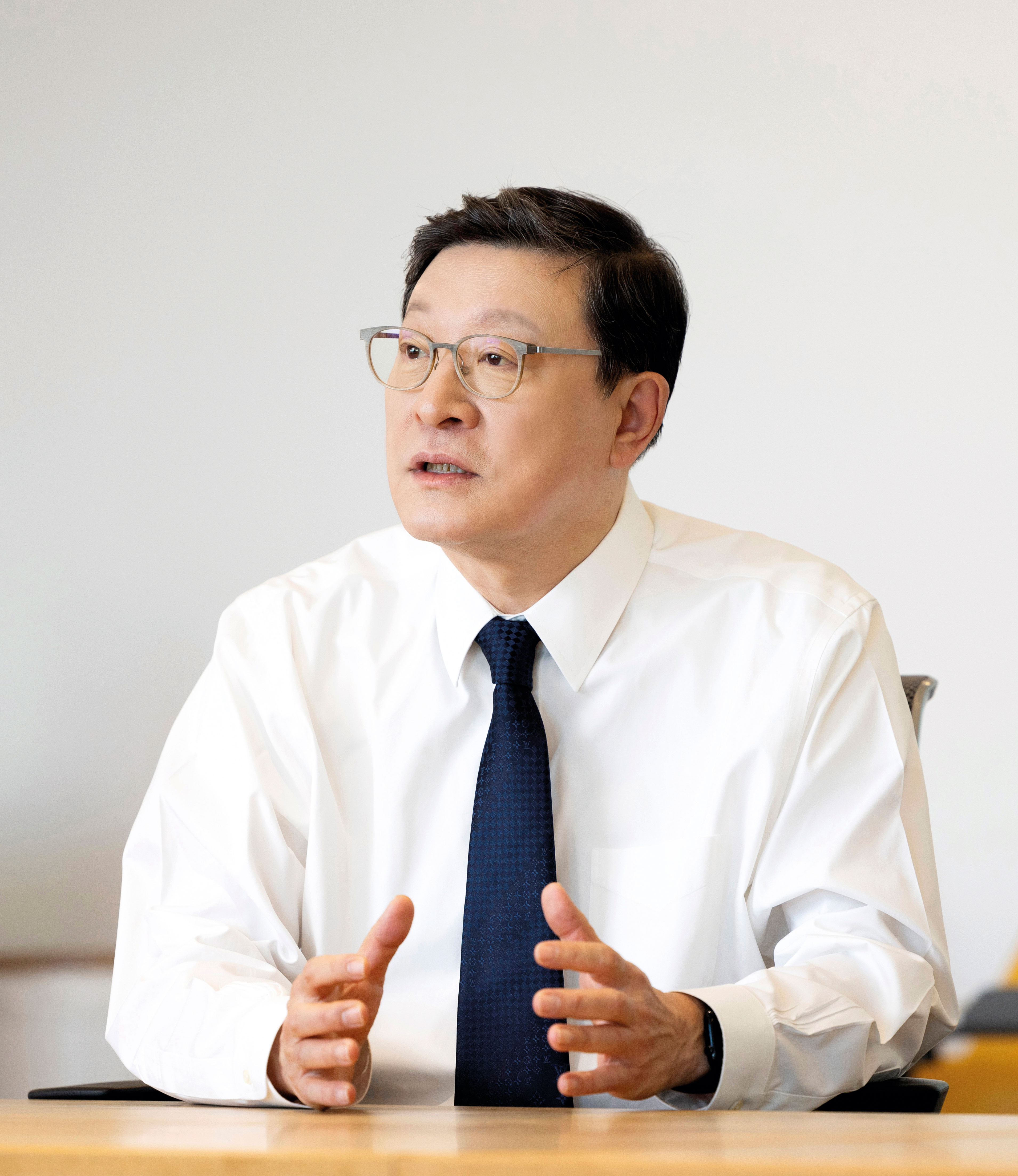Special Interview
Shaping the Next 20 Years
With Innovation in Our DNA
and Leadership in AI
Tae-soo Huh, Chairman of GS Group
Shaping the Next 20 Years
With Innovation in Our DNA
and Leadership in AI
Tae-soo Huh, Chairman of GS Group

As global competition for AI leadership intensifies, Tae-soo Huh, Chairman of GS Group, has long recognized the transformative power of artificial intelligence. A pioneer of both AI Transformation (AX) and Digital Transformation (DX), Chairman Huh has consistently led the group’s efforts to embrace innovation across its businesses. Since its establishment in 2005, GS Group has been a strong player in traditional industries such as oil refining, energy, and construction. Under Chairman Huh’s innovation-driven leadership, the group is now expanding its use of AI through a proprietary AI platform, extending its capabilities into new domains. In March, Chairman Huh was appointed the inaugural chair of the FKI AI Innovation Committee, positioning him as a key representative of both the private sector and the broader business community in Korea’s AI evolution. In this interview, Chairman Huh shares insights into GS Group’s values, its vision for the future as it marks its 20th anniversary, and the group’s AX and DX strategies.
By Hye-won Kim
Photo Credit GS Group
Q. Thank you for taking the time for this interview. The recent shifts in global trade and economics, including the U.S. tariff war, have kept business leaders exceptionally busy. How have you been navigating this period?
A. In these times of rapid and often unpredictable changes across the globe, it is more important than ever to understand the essence and drivers of change. I’ve been visiting our domestic and overseas operations to assess current conditions and listen to a wide range of expert perspectives. I’ve also traveled to countries like the United States and Japan in search of new opportunities. Also, GS Group recently marked its 20th anniversary. I took this opportunity to reflect on our journey and envisioned the next 20 years. My commitment to balanced management remains steadfast—we will focus fully on the present while also preparing for the future.
Q. Congratulations once again on GS Group’s 20th anniversary. At the celebration held in March, you emphasized the founding spirit of change and challenge. What does this milestone mean to you personally?
A. Over the past two decades, GS Group has played a pivotal role in the Korean economy and earned recognition for its competitiveness in global markets. We began in 2005 ranked 12th among Korean conglomerates, then rose to 8th in 2007, and have maintained a top-10 position ever since. This achievement is the result of strategically growing our core business. It is also the result of the dedication of our employees, strong partnerships with suppliers, and unwavering trust from our customers. This makes it all the more meaningful, and I am deeply grateful to everyone who has been part of this journey.
At this moment, I find myself reflecting on our founding spirit of “change and challenge.” Korea has transitioned from a traditional agrarian economy to a high-tech industrial powerhouse. Once a resource-poor country with zero oil production, Korea has reached astounding heights. The country is now home to world-class exporters. Today, GS Group is setting its sights on a new leap forward by pursuing digital innovation and environmental value creation as our two main pillars. We will embrace change as an opportunity and meet challenges with courage as we build the foundations for the future at GS.
Q. GS group has grown across various sectors, including retail and energy. What core values unify the group and support sustained growth?
A. Our top priority is customer satisfaction. This is not just a slogan—it’s the foundation of all our businesses. GS has consistently delivered forward-thinking solutions across industries including energy, retail, construction, and chemicals. Offering life-enriching customer solutions requires that we pay keen attention to customers’ needs. In response to today’s pressing demands for environmental responsibility and sustainability, we are actively developing carbon-neutral technologies in our energy and power divisions, while leading eco-friendly trends in retail and construction. In April, we also opened the GS Cultural Foundation to meet the growing cultural needs of our customers.
To realize our vision of customer-centric management, we are investing heavily in cutting-edge technologies. Our entry into future industries - from eco-friendly bio-processing and onshore wind power to electric vehicle charging infrastructure, virtual power plants (VPP), and carbon capture, utilization, and storage (CCUS)—reflects our strong commitment to building a better tomorrow. GS will continue its journey of innovation toward a sustainable future, always putting customer satisfaction first.
“In celebration of GS Group’s 20th anniversary,
I find myself reflecting on our founding spirit of “change and challenge.”
We will embrace change as an opportunity and meet challenges with courage as we build the foundations for the future at GS.”
Q. GS Group is known for its active participation in venture investments. What drives this “instinct for investment”?
A. We believe that strategic collaboration with startups to develop new technologies is one of the most effective ways to secure future business opportunities—and, in fact, one of the only ways to keep pace with rapid technological change. Emerging businesses require real-world experience and working prototypes; collaborating through investment helps minimize trial and error. GS partners not only with its affiliates but also with startups, venture capital firms, and private equity funds to navigate the risks and opportunities that come with uncertainty.
Our affiliates focus on investments in core and adjacent business areas to broaden our core business. Meanwhile, at the group level, we pursue high-potential, future-focused areas—what we call “beyond” businesses—through specialized investment arms. At the forefront of these efforts are GS Ventures and GS Futures. They monitor domestic and global tech trends and actively invest in sectors such as industrial biotechnology, climate tech, the circular economy, and AI-driven digital solutions. Some of these investments—including industrial biotech, circular economy initiatives, and EV charging—have now entered commercialization. We are currently working closely with industry and financial experts to accelerate this momentum.
Q. With AI driving change across industries, GS Group has accelerated its digital transformation by developing its own no-code generative AI platform. Could you tell us more about this?
A. GS recently launched a customized generative AI platform called MISO. As an AI chatbot optimized for GS, MISO is powered by internal and external data. It enables our employees to build personal AI agents without support from developers. One GS Home Shopping employee, for instance, created a tool using MISO to automatically generate broadcast analysis reports. We’ve seen many cases in recent years where employees independently applied AI to their work. With MISO as a creative playground, we expect even more operational breakthroughs.
What makes GS’s digital transformation unique is that it’s employee-driven. Without relying on external consultants, employees who understand on-the-ground challenges may address them using AI. For AI to truly shine in the workplace, AI tools must satisfy frontline staffers’ needs and be intuitive to use. A top-down approach won’t work. Instead, AI can drive real innovation with lasting impact when it is applied to where it’s needed most.
I also acknowledge that failure is part of the process. Every new attempt naturally comes with setbacks. That’s why we pursue an agile approach—quickly identifying issues and iterating toward better solutions. We’re also working to build a culture that supports experimentation, not only for frontline staff but also at the decision-making leadership level. I believe this mindset is key to a successful AI transformation.
Many of our employees, including those in our open innovation community called 52g (“5pen 2nnovation GS”), are actively driving this transformation. Without their willingness to engage with AI, we wouldn’t have made such progress. Our goal extends beyond internal efficiency—we aim to commercialize and scale the services we’ve developed in-house.

Q. As the first chair of Korea’s inaugural private-sector AI Innovation Committee, you have a leading role in the business community. In your view, how can the private sector contribute to AI innovation, and what government support is necessary?
A. At present, Korea lags behind the U.S. and China in hardware areas like AI semiconductors, large language models (LLMs), and data centers. While continued investment is important, we must also focus on practical AI adoption. As demand for AI utilization grows, this will organically boost R&D and help Korea emerge as a global AI leader. If we can successfully integrate AI into traditional industries, Korea’s industrial competitiveness will rise significantly. Businesses should not focus solely on their own interests—they should also contribute to strengthening the national AI ecosystem. Narrowing the gap with global leaders such as the U.S. and China will require bold, transformative action.
In the past, discussions on AI were focused on its potential negative effects and regulatory concerns. However, the narrative has shifted. At the AI Innovation Committee’s inaugural meeting in March, companies shared information on common challenges and exchanged ideas to improve the AI ecosystem. Moving forward, the committee will ensure industry voices are reflected in policymaking and push for meaningful regulatory reforms. As chair, I will dutifully perform my role as representative of the private sector and support the advancement of Korea’s AI industry.
Q. What led you to accept the role of chair for the AI Innovation Committee?
A. I understand that the recommendation came from both inside and outside FKI. At first, I declined the offer, but after careful consideration, I concluded that I could make a meaningful contribution. GS Group views AI as a foundation for long-term growth. Its implications go beyond mere technical transition, serving both as a tool for maximizing efficiency and a driving force for developing innovative business models. As we formulated our views on AI, we adopted the “design thinking” process to accelerate innovation. This enables us to better focus on our customers’ needs and provide enhanced solutions. Leadership in the AI era requires not only technical capabilities, but also AI comprehension and creative application. Since the chair of the AI Innovation Committee must energize the entire Korean AI sector, I believe that the support behind my chairmanship can be attributed to the history of customer-centric innovation at GS. It’s a great responsibility to take on this role at such a critical moment in Korea’s AI journey, but I will do my utmost to carry out the responsibilities entrusted to me.
Q. In 2022, GS Group unveiled the slogan “Grow Sustainably, GS” to present its blueprint for sustainable growth. How do you envision GS Group’s growth in the years ahead?
A. Through our core businesses—energy, retail, and construction—GS Group has long served as a pillar of Korea’s industrial development and a foundation of the national economy. This has allowed us to advance steadily even amid global economic volatility.
Now, we are drawn to the call of a new era. GS is embracing the winds of innovation and boldly moving toward the future. Rather than settling into our existing business domains, we are exploring entirely new sectors full of untapped potential—opening a new chapter in Korea’s industrial landscape. Our next phase of growth is focused on these four key areas: industrial biotechnology, climate technology, the circular economy, and digital innovation. In fast-moving sectors, we will pursue growth through M&A. In areas that require more time, we will continue to invest in startups to explore emerging opportunities.
Throughout this journey of innovation, digital technology and AI will be our compass. While we may not develop advanced technologies like AI semiconductors directly, we will harness our experience and data that have been accumulated over decades. Integrating our knowledge with the innovative toolset of AI will create entirely new forms of value. Our goal is not to follow in others’ footsteps, but to lead the way into the future as true innovators. That is the future envisioned by GS.
Q. You are deeply committed to discovering new growth engines through venture investment, and so, we’d like to ask about entrepreneurship, which is also a major focus of FKI’s 2025 agenda. What do you believe lies at the heart of true entrepreneurship?
A. At its core, entrepreneurship is about accurately identifying societal needs and translating them into business opportunities. Entrepreneurship is not just about pursuing profit—it’s about creating new value by solving real issues before customers and society. This requires constant innovation, a spirit of taking on challenges, and a strong sense of social responsibility. In today’s world—where businesses must respond to digital transformation, climate change, and the demand for sustainable growth—the importance of entrepreneurship has never been greater.
Q. Little is known about your personal life. What do you enjoy doing outside of work?
A. I place great importance in maintaining a balanced life. I often recharge by reading books and newspapers or watching insightful documentaries. I particularly enjoy content related to business and the humanities. More recently, I’ve developed an interest in arts and culture. In April, we opened the GS Art Center next to GS Tower and I have encouraged people to enjoy the variety of first-rate performances and concerts held there.

Q. As Chairman of GS Group and a key figure in Korea’s corporate sector, you have significant influence on the national economy. In these uncertain and challenging times, what message would you offer to the public?
A. If history has taught us anything, it’s that the Korean people have always demonstrated remarkable resilience and strength in the face of crisis. Whether during the Asian Financial Crisis in 1998 or the Global Financial Crisis, Korean companies have time and again turned adversity into opportunity, bolstered their global competitiveness and achieved meaningful growth. However, we cannot rest on our achievements. We must hone our drive for innovation and vigilantly seek new business opportunities. Although it is tough now, I believe it is precisely in times of upheaval like these that we can unlock our true potential and take bold steps toward the future.